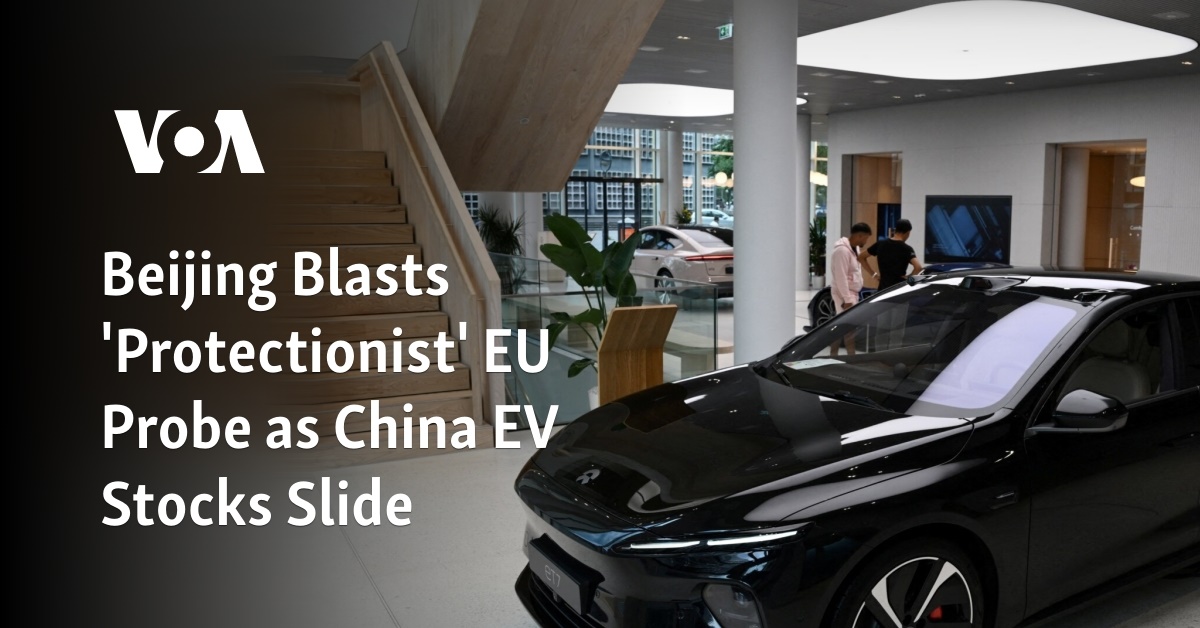The article discusses the potential for the West to use China's economic slowdown to gain an advantage in the electric car race, highlighting the need for a different approach to counter China's advantage. The author suggests welcoming Chinese investment and immigration of skilled Chinese scientists to strengthen the American EV industry and potentially weaken China.
Chinese companies have increased their presence in cutting-edge materials and electric vehicles, making it challenging for other countries to reduce their dependence on Chinese supply chains, despite protectionist measures.
European car manufacturers face an unwinnable battle with China as the EU proceeds with its ban on petrol cars, according to the CEO of BMW.
Europe's carmakers are facing a tough battle to catch up with China in the development of affordable and consumer-friendly electric vehicles, with Chinese EV makers already a generation ahead, according to industry analysts and executives at Munich's IAA mobility show.
Chinese electric vehicle maker Xpeng plans to expand into more European markets, including Germany, Britain, and France, in 2024, aiming to challenge European companies with cheaper models.
Millions of auto workers and suppliers in China are facing pay cuts and layoffs as an electric vehicle price war leads carmakers to reduce costs, impacting the industry and the broader economy.
China's automobile and component exports have doubled in 2021, leading to an investigation by the European Commission into subsidies given to Chinese electric vehicle makers, as European automakers express concern over competition from China in the growing electric vehicle sector.
Tesla is expected to benefit from European protectionist measures as regulators crack down on Chinese electric vehicle (EV) competition, causing stocks of Chinese EV companies like NIO and XPeng to plunge.
The European Union's increasing scrutiny of Chinese electric-vehicle companies has caused tension between the two, impacting the EV space and EU-China relations.
The European Union is launching an "anti-subsidy investigation" into Chinese electric vehicles due to the distortion of the market caused by "huge state subsidies," potentially leading to tariffs to counteract the financial support provided by the Chinese government.
China and the European Union held talks on topics including artificial intelligence and cross-border data flows in Beijing, amid tensions over an EU probe into China's electric vehicle subsidies.
The European Union is unlikely to impose new tariffs on Chinese electric cars as the anti-subsidy probe must be conducted properly, according to a European Commission official.
German carmakers are concerned about potential retaliation if the EU imposes duties on Chinese electric vehicles, according to German Economy Minister Robert Habeck, who also acknowledged a Franco-German divide over the anti-subsidy probe.
New Brexit trade rules regarding electric vehicles may cost European manufacturers £3.75bn and reduce EU factory output by 480,000 vehicles over the next three years, according to the European Automobile Manufacturers Association (ACEA).
The European Automobile Manufacturers’ Association is urging the EU to scrap plans for 10% tariffs on electric vehicle manufacturers who do not source all their parts from within the bloc and Britain, warning that this could result in a £3.7bn cost and drive up consumer prices.
Former President Donald Trump is attacking President Biden's push for electric vehicles, claiming they threaten blue collar livelihoods and that all EVs will be made in China, using this issue to try to win over auto workers and swing-state voters for his potential 2024 presidential campaign; however, EVs are not a hoax and are increasingly affordable and viable, helping to cut carbon emissions and address global warming.
The European Commission has launched an investigation into Chinese electric vehicle subsidies, which will be fact-based and conducted in accordance with EU and WTO rules.
The EU's chief trade negotiator, Valdis Dombrovskis, expressed concern about European businesses in China due to tough security laws and a politicized environment, while also highlighting the EU's assertive actions against Chinese subsidies for electric vehicles; this signals a fraying in business ties between the EU and China, potentially leaving everyone worse off.
European regulators are investigating subsidies given to Chinese automakers that may be affecting European companies, including Tesla, but investors do not appear concerned.
The rise of electric vehicles in China is causing a shakeout in the auto market, with midsize automakers struggling to compete with local rivals and the government supporting select companies in its bid to become an automotive powerhouse.
Legacy carmakers like Ford are struggling to catch up with the electric vehicle (EV) revolution led by Tesla and Chinese competitors, as they face a significant technology gap and higher production costs, which hinder their ability to deliver affordable EVs while governments are planning to ban or limit gas and diesel car sales.
Chinese electric vehicle companies NIO, XPeng, and Li Auto are benefiting from an ongoing price war, with their EV deliveries looking strong.
The European Commission has initiated an anti-subsidy investigation into Chinese electric vehicles, which could potentially lead to the imposition of tariffs on imports from China within the next 13 months.
The European Commission has opened an investigation into China's electric vehicle sector, citing evidence of subsidies that could harm the EU industry and potentially result in import duties on vehicles from China.
Tesla's China-made EV sales decreased by 10.9% in September, while Chinese rival BYD saw a 42.8% growth in passenger vehicle deliveries, as both companies navigate the market's changing consumer sentiment and economic stabilization.
